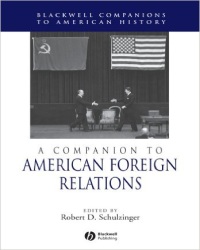Robert D. Schulzinger – A Companion to American Foreign Relations (2003)
840 ₽
Автор: Robert D. Schulzinger
Название книги: A Companion to American Foreign Relations (2003)
Формат: PDF
Жанр: История Америки, Австралии, Океании
Страницы: 577
Качество: Изначально компьютерное, E-book
This is an authoritative volume of historiographical essays that survey the state of U.S. diplomatic history. The essays cover the entire range of the history of American foreign relations from the colonial period to the present. They discuss the major sources and analyze the most influential books and articles in the field.
The history of American foreign relations is the story of power – power in its many
forms. Historians have written thousands of books describing, explaining, analyzing,
puzzling over, praising, and criticizing the application of American power. In its
broadest sense, power consists of the ability to affect the behavior of others. It can
involve the use of physical force, but there is also soft power. The modes of influence
and compulsion are as much cultural and intellectual as they are political and
military.
The essays in this Companion explore the ways in which Americans have understood
and applied power and influence from the beginning of the Republic to the
beginning of the twenty-first century. They explain how this understanding has
grown and changed over the centuries. They analyze the ways in which advocates of
the use of power have praised the men and women who have wielded it. They also
show how critics of the misuse of power have presented their arguments and
sometimes prevailed in the struggle for intellectual primacy.
The contributors to this Companion, all prominent scholars of the history of US
foreign relations, have explained the ways in which the study of US diplomatic
history has changed in the last generation. These changes occurred alongside a major
transformation of the study of American history more generally. Both occurred as
part of the major upheavals in American society during the 1960s. Foreign affairs,
especially the agony of the Vietnam War, played a prominent role in this
transformation.
As many Americans questioned the assumptions, activities, and integrity of leaders
of public and private institutions, the study of history itself became more critical of
these institutions. Historians looked at the inarticulate, those without a voice, people
left out. History of government, public institutions, leaders, politics at one time or
another in the last thirty years seemed to some historians increasingly irrelevant to
understanding how American society developed.
In some forums, the study of diplomatic history became emblematic of the
limitations of traditional history. Some advocates of new ways of looking at the past
decried what they perceived to be the narrowness of vision of traditionally trained
diplomatic historians. The cruel jibe, heard often twenty-five years ago, that diplomatic
history was the story of what one clerk said to another encapsulated much of
the criticism aimed at the field. Diplomatic historians themselves sometimes were
among the loudest critics of their own work. And yet, even as some scholars of the history of US foreign relations felt
embattled, the books and articles kept coming. They had a ready audience. Consult
any bestseller list, see what people are buying at Amazon.com, or stroll through any
bookstore (be it an independent, a college bookstore, or one of the mega chains)
and it is obvious that no subject is more written about than America in the world.
Classes in foreign relations, America abroad, or the wars of the nineteenth and
twentieth centuries are packed.
As much as historians of American foreign relations have felt embattled by the
criticism directed at them, they have also taken it to heart and learned from it. The
essays in this Companion show that the recent scholarship on the history of US
foreign relations has been deeply informed by many of the same theoretical considerations
historians of American culture and society have used to transform their parts
of the study of American history. Recent scholarship on American foreign relations
explores the views and actions of those previously ignored. It is anything but the
story of what one clerk says to another. The works analyzed in this collection deal
with the use of state power. In the first seventy-five years of the twentieth century,
international historians worked within a framework of the state as the principal,
usually sole actor, on the world stage. The state is still vitally important, and these
essays show how the understanding of state power has been enriched by the insights
of political scientists and cultural analysts.
One major and often overlooked project of the modern state is the keeping and
preservation of records. The United States excels in opening archival material.
Government archives are open to all. Other depositories maintain different rules of
access. Taken together, the hundreds of public and private archives throughout the
United States set the standard for access to scholars. A major product of this archival
abundance appears in the books and articles discussed in this Companion. Many of
these essays show how contemporary scholarship has been able to get inside the
highest levels of the US government to show how real men and women applied
their ideas and their assumptions, sifted evidence, explored alternatives and made
decisions. This abundance of archival material has made it possible to explore the
actual workings of the state.
The idea of narrative has undergone serious scrutiny in the last twenty-five years.
The multiplicity of sub-fields within the larger discipline of history has forced
teachers to scramble to incorporate the new material into a master narrative. Teachers
of the history of US foreign relations face the same problem. In the old days, before
1970, most courses followed a straightforward narrative of the rise of America to
world power. Courses followed the contours of presidential administrations, alternating
between and among the major political parties. Wars and other diplomatic crises
provided the points of punctuation. The ways in which public officials and members
of the general public behaved in crisis and war became the major subject matter of
the history of foreign relations. The United States had relations in many parts of the
world, but clearly some areas took precedence over others. Americans paid more
attention to Europe and Asia than other regions.
That master narrative has broken down. The essays in this Companion demonstrate
the rich variety of ways in which the narrative of US foreign relations has
changed. The first three essays cover ideas, culture, and the environment throughout
the course of American history. Essays that follow explore a mixture of chronology regional relations, and the major wars and crises from the late nineteenth to the early
twenty-first century. No single college course could hope to cover this variety of
subject. Indeed, most of these essays could be considered guides to the literature of
individual courses of interest to specialists in the field.
This Companion is a snapshot of the state of diplomatic history at the beginning
of the twenty-first century. It shows a vibrant discipline, one that absorbs the
attention of scholars, students, and, more than most aspects of American history, the
reading public. For a brief period after the end of the Cold War, many people
interested in foreign affairs observed a distressing insularity among Americans.
Newspapers, news magazines, and television networks devoted less and less attention
to news from beyond American shores.
When people spoke, either hopefully or in dismay, in the early 1990s of the end
of history, they meant both that the great ideological struggles of the twentieth
century were over and that people no longer cared about the past. Neither concern
seemed to be very salient after the attacks on New York and Washington, DC on
September 11, 2001. Even at the supposed height of American indifference to
foreign affairs, students filled courses on the history of US foreign relations. Books
on the wars and great crises of US foreign relations filled readers’ shelves.
It is likely that the next twenty-five years will see as many changes in the shape
and subject matter of US foreign relations as did the last decade of the twentieth
century. Archives around the world will continue to release new documentary
evidence showing the way people in power made real decisions. Diplomatic historians
will continue the dialogue with other historians and other scholars in disciplines now
considered to be unimaginably remote. As long as the United States continues to
play a predominant role in world affairs, the origins, development, consequences,
and alternatives of that role are bound to attract serious attention.






Отзывы
Отзывов пока нет.